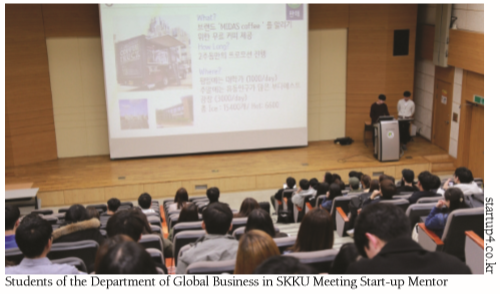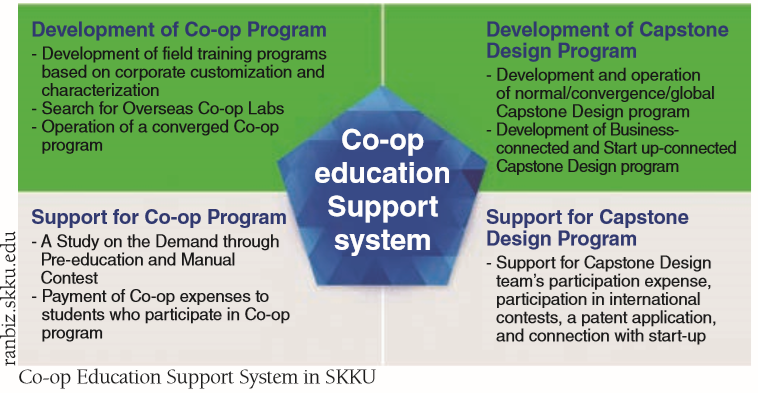Most people usually think that education is just limited to the classroom. Recently, however, there has been a kind of education that has started to break the stereotype: Co-operative (Co-op) Education. “Co-op Education” allows students to have work experience at companies outside of the classroom. SKKU, for example, has now included co-op education programs in its startup support program. Therefore, the Sungkyun Times (SKT) now finds out more about what coop education is, looks for the co-op education programs at SKKU and examines some of the potential problems and solutions.
What Is Co-op Education for University Students?
Concept of Co-op Education in University and its Present Condition
In 2017, the Ministry of Education (MOE) amended the Enforcement Rule for the Operation of Field Experience for University Students, defining co-op education as a field practice in which institutions can participate on helping university students apply theories they learned in classrooms and get on-site practical education. Co-op education programs include student teaching and hands-on experience for students in the Department of Architecture, Business administration, and Electronic and Electrical Engineering. According to a survey conducted by the National Research of Korea (NRF) of co-op education programs at universities in 2016, 77.9% of four-year universities and 95% of vocational universities operated co-op education programs. Although the percentage of vocational universities that operate coop education programs is higher than that of four-year universities, the actual number of universities with co-op education programs is higher in four-year universities. Also, the number of co-op education programs is increasing every year; more than 9,000 companies participated in co-op education between 2014 and 2016. In particular, the number of four-year universities conducting startup co-op education programs for students at the Department of Business Administration tripled between 2013 and 2016, some of which accepted the co-op education courses as credit courses. The startup co-op education program involves hands-on experience in the startup process with a mentor.

Co-op Education Programs at SKKU
① Departments of SKKU Offering Co-op Education
There are some departments that operate co-op education programs at SKKU as well. The Department of Business Administration, for example, accepts participation in a startup co-op education program as a credit course only if a student belongs to a startup club as well. In a co-op education training program which has been offered to students who want to be management consultants, for example, experts provide them with hands-on training for business consulting on site and support them as mentors. The Department of Consumer and Family Science is another department that offers co-op education. If students want to have hands-on experience at a co-op education company related to their major but cannot find one, they can contact the Organization of Consumer Affairs Professionals (OCAP) by the aid of the administrative office. In addition, most departments such as the Department of Design, the College of Education, and the Department of Architecture require co-op education experience of students because hands-on experience in those major is crucial.
② Qualification of Participating in Co-op Education and Procedures for Getting Credits
At SKKU, students who have completed four semesters or more are eligible to apply for co-op education. Students who are in their last semester are not qualified since they are supposed to graduate. The period of co-op education is four weeks or longer with six to eight hours per day and 40 hours per week. If the co-op education period is shorter than four weeks, then it is not acceptable for credits. If students want co-op education experience to be accepted as credits, they must apply in advance with required documents under the condition that the coop education fits with the purpose of it. Each department has different types of co-op education courses and credits that are acceptable by participating in co-op education on site, so students must check before applying.
③ Process of Co-op Education

To participate in co-op education, Kingos should submit a checklist about the suitability of the education for their major to the co-op Education Committee after getting a signature from the head professor of their departments. Kingos must also complete an onsite training program on the website called “tollgate” prior to their participation in the co-op program. While having hands-on experience, Kingos are required to complete and submit comprehensive reports every week, and the representative of the companies must check the attendance and complete an evaluation sheet as well.
The Reality of Co-op Education for University Students
Despite the trend of increasing co-op education, however, issues regarding co-op education for university students are still left unsolved for the following reasons.
Controversy over “Passion Pay”
According to Article 5 of the Enforcement Rule for the Operation of Field Experience for University Students, co-op education institutions are required to pay the trainee students for on-site training to enhance the performance of the students. A payment is determined and made by the university and the company; it includes the expenses for necessary materials and transportation. Nevertheless, according to a survey conducted by the Higher Education Statistics Agency (HESA) from 2015 to 2017, only 41.9% of the all students who completed the co-op education got paid for their participation, and 58.1% responded that they did not. Even though the Enforcement Rule was amended to solve this problem, it still does not obligate the payment, allowing the co-op education institution feel free to neglect the payment for the students. In this unfair situation, however, university students have no choice but to work anyway to obtain credits or certificates without resisting because co-op education is essential for them to obtain important certificates. Recently, for example, co-op education experience is required to obtain most certificates, including those for social workers, lifetime educators, morticians, care helpers, nutritionists, and so on.
Inadequate Treatment of Students
Many co-op education trainees are not recognized as workers because they are university students; therefore, there is a blind spot where four major insurances, which are essential for workers, are not guaranteed for the students. According to a report by the Korea Higher Vocational Education Association (KOHVEA) in 2016, the percentage of students from four-year universities who were not guaranteed social insurance was 12.2%. In other words, one to two out of 10 co-op education students are not insured in the case of an industrial accident during a co-op experience. If students are not insured, it is difficult for them to be compensated for accidents on site. In September, 2017, for example, a student at Daegu University (DU) fell to his death because of poor onsite management while working on the co-op site. For even two months after his death, however, his family could not receive any compensation because he was not insured.
Incompletely Organized Systems
Imbalance of supply and demand for co-op education is serious. The universities are having a hard time as companies feel burdened about accepting co-op education students because of the increase in the minimum wage; therefore, co-op education is not working smoothly. Usually, most of the professors visit organizations in person to secure hands-on positions for students. Because coop education belongs to government-funded programs, some universities open co-op education courses even when they are unnecessary, with the intention of earning money. As a result, coop education programs at universities end up being run poorly. In the Industrial-Academic Cooperation Leading University (LINC +) project evaluation criteria, the “proportion of co-op education trainee students” is given 15 points out of 100. Based on the information on HESA, only 52.7% of industries prepare for coop, which is relatively low. Meanwhile, when it comes to student teaching, students who did not actually have hands-on experience might be given false grades. At a private high school in Gwangju, for example, a university student who had not participated in co-op education got a decent score and their diary was also falsely written.
Co-op Education Unrelated to Majors
Even when students participate in co-op education, students at the school of humanities tend to have less hands-on experience related to their majors than those at the schools of natural sciences or engineering. Many humanities students, instead of having experience related to their majors, might end up doing chores such as cleaning or copying papers which was not what they wanted to experience at co-op education companies Additionally, even in the case of student teaching, students in the Education Department often fail to have hands-on teaching experience.
Solutions for Better Co-op Education
To address the problems mentioned above, the government, companies, and universities should prepare for a better system by communicating with each other.
Governmental Support for Co-op Education
The government has been operating co-op education programs to improve the connection with the majors of humanities students, but universities are not participating due to the financial burden. Therefore, for these co-op education programs, the government should reduce the financial burden and provide more co-op education experiences to humanities students. In response, the MOE will allow universities to use the budget for co-op education to extend co-op education programs. Meanwhile, to reduce the burden of companies participating in co-op programs, the Ministry of Employment and Labor (MOEL) supports 400,000 for each university. Additionally, the government should refrain from making co-op education mandatory for all majors by linking it with governmental financial support projects, leaving the choice to open a course, or not, to universities. It is also necessary to regulate the payment as mandatory by the Enforcement Rule of the MOE.

It is necessary for industries to comply with regulations related to co-op education especially when it comes to wage problems. Incentives are necessary for the faculty involved in co-op education in order to make a more systematic co-op education process; at the same time, the faculty should prepare co-op education courses at the same level as regular courses. Discussions about the training guidelines with the company, the designation of industry staff, and evaluation methods should all be related to one another between the university system and the co-op. Pai Chai University (PCU), for example, was the only university to win three prizes in the Industry Professional Practice (IPP) Competition in April, 2018. Neo Probe, a company that participated in the competition with PCU, received the Excellent Award in the co-op education company category, and PCU received the award in the IPP business team and the coop education student’s categories. PCU said that improving an inspection report by matching high-quality human resources and communicating with co-op education companies have greatly increased its competitiveness. Therefore, cooperation between universities and businesses is a key to developing practically talented individuals and local industries.
Seeing a recent increase in co-op education programs, universities and students, as well as organizations, should communicate with each other smoothly during co-op programs. Therefore, it is time for university and company representatives to reflect on Korean universities’ co-op education programs.
